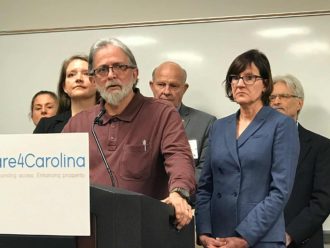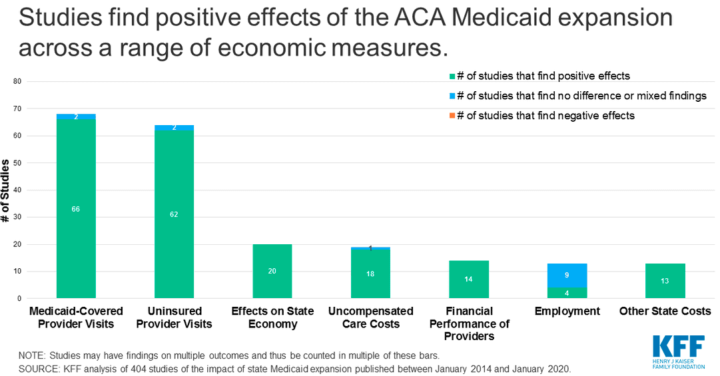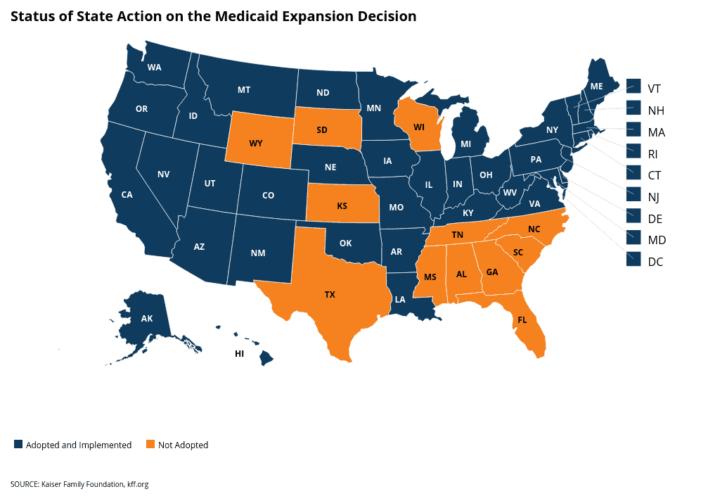By Clarissa Donnelly-DeRoven, North Carolina Health News
Nearly an hour into the August meeting of Macon County’s board of commissioners, Casey Cooper approached the podium. Cooper is the CEO of the Cherokee Indian Hospital. In addition to running the hospital, Cooper serves on a handful of different boards and has three kids — in other words, he’s busy.
“In the interest of efficiency, I will just jump right to the punchline,” he began. “It’s my hope that at the conclusion of this presentation tonight that you will feel compelled to support a resolution to help close the coverage gap in North Carolina.”
By “close the coverage gap” Cooper was talking about expanding Medicaid to offer health insurance to the hundreds of thousands of North Carolinians who make too much money to qualify for Medicaid right now, but don’t earn enough to qualify for subsidies to buy an insurance plan on the Affordable Care Act marketplace.
He had good reason to believe Macon County commissioners might support it. Cooper had already given the same presentation to Swain and Jackson counties’ Boards of Commissioners the month before, after which they unanimously passed resolutions supporting Medicaid expansion.
Jackson and Swain, both rural counties in western North Carolina, aren’t exactly outliers. In signing their resolutions, they joined two towns in the region, Waynesville in Haywood County and Franklin in Macon County, which already signed resolutions supporting expansion, along with Reidsville in Rockingham County, and two other rural counties — Watauga and Franklin — that signed their own resolutions.
Brian McMahan, the chairman of Jackson County’s Board of Commissioners, explained that he was in favor of Medicaid expansion before Cooper came to speak with the board, but he described the presentation as “thorough” and “compelling.” He said it strengthened his resolve.

“We literally have people who are dying because they don’t have access to health care,” McMahan said. “And if that’s not enough reason, the fact [is] that it’s a job creator.”
Ben Bushyhead, the chairman of Swain County’s Board of Commissioners, said the same.
“We can’t afford not to do it,” he said. “It is not a Republican-Democrat thing at all. It’s what the needs are within our county and the people who need these services.”
Though Swain and Jackson voted for Republican Donald Trump in the 2020 election, their county commission boards are majority Democratic. Franklin and Watauga’s boards were also majority Democratic at the time they passed the resolutions, while the mayors of Waynesville and Franklin were elected without party affiliations.
In North Carolina politics, the issue of Medicaid expansion usually falls along rigid partisan lines: Democrats support it, Republicans oppose it. But Cooper held steadfast to the belief that this Republican region of the state could be persuaded to depart from the party line if only someone would give residents the straight facts.
Macon’s board agreed to hear Cooper’s presentation, but gaining the county’s support would perhaps pose a greater ideological challenge than Cooper faced in the other WNC counties: four Republicans and one Democrat sit on Macon’s Board of Commissioners. Nonetheless, he was ready to make his case.
‘It’s about my neighbors’
Back in 2019, Dale Wiggins, the Republican then-chairman of Graham County’s Board of Commissioners, publicly clashed with Senate leader Republican Phil Berger (Eden) over Medicaid expansion. Graham County’s board passed a unanimous resolution supporting a bill, co-sponsored by then-Rep. Kevin Corbin (R-Franklin), which would have expanded Medicaid coverage.

“What we have learned is if you cut out all the political rhetoric and just get down to the real facts of this issue, which then that puts it on a human being level, it’s not about Republicans. It’s not about Democrats,” Wiggins said in a recent conversation. “It’s about my neighbors, your neighbors, [who] are human beings. And in 2021, people need health care.”
Wiggins and Cooper began working closely together at the end of 2020 while serving on the North Carolina Council on Health Care Coverage, a bipartisan group convened by Gov. Roy Cooper tasked with studying how other states expanded health care coverage to its residents, and coming up with plans for how North Carolina might do the same.
North Carolina is one of 12 states that has not expanded Medicaid coverage. The Affordable Care Act originally mandated that states expand their Medicaid coverage, but a 2012 Supreme Court ruling overturned that part of the law, instead making expansion of each state’s Medicaid program an opt-in policy.
In order to qualify for Medicaid coverage in North Carolina today, Casey Cooper explained in an interview, “If you are an adult, you have to be below 42 percent of the federal poverty level to qualify, and, I mean, that’s horrible. That’s like $7,000 or $7,300 a year.”
“If you’re a mama with two babies — and it’s not uncommon, right, to be a single mom with two babies — you don’t qualify for Marketplace subsidies until you get to $21,000 a year,” Cooper said. “If you make between $9,000 and $21,000 a year, you can’t get coverage.”
People who work full-time minimum wage jobs in North Carolina fall squarely into this gap. State minimum wage is $7.25 an hour, meaning someone working 40-hours a week would bring home $14,500 before taxes.
Expansion would open up eligibility to workers – with and without children – earning below 138 percent of the federal poverty level ($23,791 for a family of two).
In North Carolina, there are about a million nonelderly people who are uninsured, according to a 2020 report by the Kaiser Family Foundation. Were the state to expand Medicaid, between 400,000 and 626,000 of those people would become eligible for coverage. A good chunk of those people live in Western North Carolina.
Cooper said it was “overwhelmingly” clear that rural North Carolinians and their health systems would benefit from expansion. As he and Wiggins began planning how to get the message out, the advocacy coalition Care4Carolina also got involved.
In March Brittney Lofthouse, engagement coordinator in WNC for Care4Carolina, joined Cooper and Wiggins on a Medicaid expansion information panel held at Southwestern Community College.
“I lost my dad to cancer in 2013. And one of the biggest reasons why we lost him as quick as we did was he didn’t have health insurance, so he couldn’t get treatment for his cancer,” said Lofthouse, a Sylva native.

For decades, studies have found that people who are uninsured are far more likely to die from cancer than those with insurance. Lofthouse’s father died just a month before she gave birth to her first child.
“We wanted to focus on how else other families in western North Carolina could be impacted,” she said. “Knowing that I lost my dad to cancer, and I knew that not having insurance was a primary factor in that, we wanted to see what we could do to kind of bolster that support in the west and kind of dispel a lot of those myths.”
They imagined that by addressing each county individually they could tease out the specific data that might persuade people, regardless of their party affiliation, such as how many more people would gain coverage, how many jobs would be created, how much money the counties might save on things like health care for people in jail awaiting pretrial detention, and more.
Data and ‘misconceptions’
Cooper gives essentially the same presentation to each county. He begins with context about who conducted and who funded the research he’s about to present — Georgetown University, George Washington University, and the task force on coverage expansion that he sits on.
He follows with a disclaimer: “This data has been shared pretty widely across the state and to my knowledge has not been contested or questioned by anybody.”
Then, he customizes his presentation with county specific facts.
While making his case to Macon County this summer, Cooper said “about 21.7 percent of your working, nonelderly adults are uninsured, and closing the coverage gap could lead to providing coverage for about 1,300 of your citizens, create about 62 jobs and about $169,000 in county revenues, and about $10 million a year in new business activity.”
Then Cooper goes through the “myths” about expansion.
“One of the misconceptions about closing the coverage gap is that the folks that are uninsured are too triflin’ to work, and it’s simply not true. The data clearly demonstrates that the majority of folks that are uncovered are working,” he told the Macon commissioners. “Unfortunately, they’re working and they’re working poor.”
Cooper points out that many of the uninsured in the western part of the state are white people, mothers and veterans.
“Most of the time, it’s mamas who are taking care of babies who still have Medicaid, they got their babies covered, they’re getting well child visits for the babies, but these mamas are going without coverage,” he said.
Cooper argues that expanded coverage would help rural hospitals by decreasing the number of uninsured people who use the health care services, but aren’t able to pay their bills. Uninsured patients overusing the emergency room often put rural hospital budgets in the red.
“The more folks you can bring into your system that have health insurance coverage, the more people that you can use to offset the loss you’re going to have from the uncompensated care,” Cooper said.
Then, he gets to the biggest sticking point for many: “There’s another misconception that the state of North Carolina can’t afford [Medicaid expansion].”
The financial case for expansion
Over the next three years, Cooper explains, the cost of expanding Medicaid coverage in the state is estimated to cost about $5 billion. Federal law guarantees that the federal government pays 90% of the cost of expansion beneficiaries indefinitely, leaving the state to cover about $500 million over the next three years.

The state has identified a number of ways to foot its 10% of the bill, he said. Options include premium tax collections on the health care entities now providing coverage through the state’s Medicaid transformation program, taxes on hospital assessments, and money the state will no longer need to spend on uninsured people.
“Now is exactly the right time for North Carolina to expand because there is an additional $1.7 billion worth of incentives for the state of North Carolina if it expands Medicaid,” he told the commissioners.
In an effort to convince the 12 states that have not yet expanded Medicaid to do so, the federal government is offering to increase their contribution to each state’s program by 5%. In 2022, the federal government will pay almost 74% of North Carolina’s Medicaid cost, according to the Kaiser Family Foundation. If the state expanded, the federal government would pay 79% of the cost for those already enrolled in the program, and 90% of the cost of coverage for those newly added.
“On your regular Medicaid, that increase by 5% is estimated to be $1.7 billion over the eight quarters following expansion. And that $1.7 billion has been estimated to cover the state share for six years. That gives the hospitals and the health plans six years to ramp up and to be able to pay the assessments,” Cooper said.
“Not only is it affordable, this is exactly the right time for the state to do it.”
After a few minutes of discussion and questions, the Macon County Board of Commissioners set the resolution to a vote. It passed, 4-1.
Republican commissioner Paul Higdon, the sole “no,” said at the meeting he thought Cooper’s presentation was good and compelling, but that the commissioners were the wrong audience for it, considering it’s a policy voted on at the state level.
Those who voted in favor of Medicaid expansion resolutions disagree.
McMahan, the chairman of Jackson County’s Board of Commissioners, said, “It sends a message to the state government to say, ‘We feel like it’s important for our community, for our area.’
“I’m here. I live and work in the district… Sometimes there’s this sense of disconnect. [State and federal representatives] don’t really have the connections that local people have,” McMahan said. “I think having that recommendation coming from a local government entity carries some weight.”
“If you can get all 100 counties in our state to speak with one voice, it’s probably the most powerful thing you can have,” concurred Macon County Commissioner Ronnie Beale. “If you get the 548 County Commissioners pulled in one direction, you can get about anything you want passed.”
Not all of WNC is on-board
Following Macon County’s yes-vote, Cooper gave his presentation to the commissioners in Haywood, Clay and Cherokee counties. Majority Republican Clay County passed a unanimous resolution in support of expansion last week.
Cherokee County’s board has not yet voted on the resolution, and no commissioners responded to requests for comment.
Kevin Ensley, the Republican chairman of Haywood County’s Board of Commissioners, said he does not plan to put the resolution to a vote.
“I mean, I support it. And I think another one of my commissioners does, but I got three more that are a little uncomfortable with it, I guess,” he said. “I’m not ready to put it on the agenda to vote on because I don’t think it’ll pass.”
Jennifer Best and Tommy Long are two of the hesitant Haywood County commissioners. Best is an insurance agent. She hasn’t sold health insurance for a few years, but when she did she saw many people who fell in the coverage gap.
“They deserve coverage, too, but I just don’t know who pays for it,” Best said.
The funding of the program is also what gives Long pause, though he complimented the presentation.
“His comments were well taken and his points about the impoverished western counties’ health care needs sobering,” he said, “Certain counties here in the mountains and the Eastern Band have circumstances that limited Medicaid expansion would certainly help.”
The Raleigh News and Observer reported in early October that Senate leader Berger indicated behind closed doors that he was open to negotiations involving expansion. However, in a statement last week, Berger’s office maintained the senator’s opinion has not changed, and that he believes Medicaid expansion is “bad policy.”
At the federal level, legislators are considering offering Marketplace subsidies for residents in non-expansion states who make up to 138% of the federal poverty line and providing coverage through a federal Medicaid program.
In the meantime, Cooper’s presentations and the votes on local resolutions chug on. At the end of September, Brevard, the largest town in Transylvania County, signed a resolution supporting expansion. Monday evening, Cooper is set to make his case before the Transylvania County Commission.
Story note: A representative for Care4Carolina is quoted in this story. Care4Carolina pays for a sponsorship on NC Health News’ website.
Correction: This story initially said Medicaid expansion would open eligibility for those making 100% to 138% of the federal poverty rate. Medicaid expansion would open eligibility for anyone making up to 138% of the federal poverty rate.
North Carolina Health News is an independent, non-partisan, not-for-profit, statewide news organization dedicated to covering all things health care in North Carolina. Visit NCHN at northcarolinahealthnews.org.



Before you comment
The comments section is here to provide a platform for civil dialogue on the issues we face together as a local community. Xpress is committed to offering this platform for all voices, but when the tone of the discussion gets nasty or strays off topic, we believe many people choose not to participate. Xpress editors are determined to moderate comments to ensure a constructive interchange is maintained. All comments judged not to be in keeping with the spirit of civil discourse will be removed and repeat violators will be banned. See here for our terms of service. Thank you for being part of this effort to promote respectful discussion.